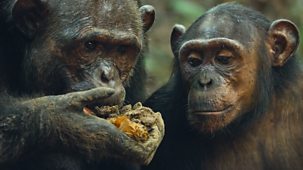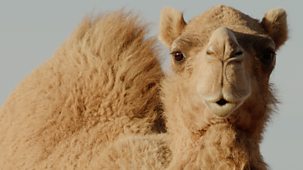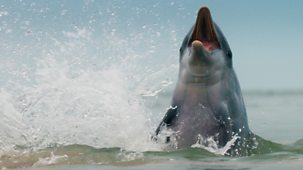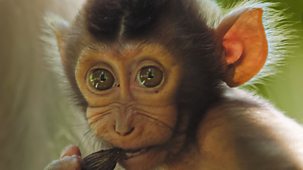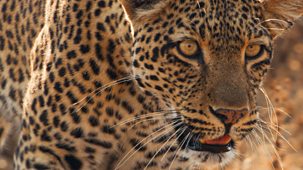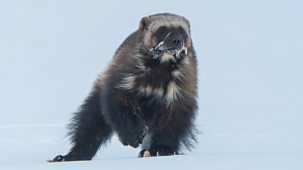
Series 1: 4. Cold
Having honed their survival strategies over millennia, mammals have evolved to be masters of the cold. In this episode, we journey across the globe, exploring a frozen world, from icy seas to snow-capped mountains and meet the unique mammals that call them home. For most, the cold is a killer. But for mammals, with their unique physical traits like warm thick fur and rich nourishing milk, and remarkable behaviours like hibernation, conquering the cold is possible.\n\nWe begin our journey on the Arctic islands of Svalbard, where polar bears, synonymous with this cold archipelago, dominate this remote frozen world. But as their world warms, and the frozen seas that are their hunting grounds disappear, they are being forced to find new sources of food. For the first time, we follow a polar bear hunting on land as it heads high up into the mountains in a rarely seen long-distance pursuit of Svalbard’s reindeer.\n\nMammals have been forced to adapt to the cold for millions of years. Whereas other species avoided the series of thick ice sheets that once covered a quarter of all land, mammals were able to survive the freezing conditions, and by adapting their behaviour, many are now completely at home in these inhospitable lands.\n\nOne land that has little changed since the last ice age is the tundra of northern Alaska. In this remote, hostile landscape, a mythical and rarely seen mammal endures: the wolverine. They rely completely on snow to survive, providing them meat from animals that have succumbed to the cold and dens in which to raise their young. Whilst other animals either flee or hibernate to avoid the coldest time of year, they stay active all winter, traversing the vast landscape in search of food. This privileged view reveals a surprisingly caring side of a highly elusive animal.\n\nKnowledge can play a huge role in surviving the cold. Rather than roaming huge distances, some smart mammals will return annually to places they know will provide them with food. In Canada’s northern Yukon, a unique community of bears has been passing knowledge down the generations of a special ice-free river. While most bears are already hibernating, this late flowing river allows chum salmon to spawn into the winter months, giving the bears an opportunity for one last feast before hibernation that they simply cannot resist.\n\nMammals’ ability to hibernate is a clever way to avoid winter, and deep underground in an abandoned mine, little and big brown bats are well into their hibernation. But not all stay asleep. One sneaky bat wakes in order to mate while the rest of the colony sleeps on.\n\nBringing newborns into a world of snow and ice has many challenges, but mammals’ unique ability to produce fat-rich milk allows harp seal mothers to have one of the shortest weening periods of all. In just 12 days, off the coast of Greenland, they race to fatten their pups to independence as the icy nursery melts around them.\n\nFar above sea level, the remote Kluane Mountains of North America support the largest ice field outside the poles. In this rugged landscape of rock and ice, pika, a relative of the rabbit, patiently wait for summer. Having stayed awake all winter, surviving on food they collected last year, once summer does return, they will all have just a few weeks to harvest nearly a year's worth of food before the winter lockdown begins again. But storing your hard-earnt supplies all in one place comes at a risk if you can’t trust your neighbour.\n\nAveraging 4,000 meters above sea level, the thin air of the lofty mountains of the Qinghai-Tibet Plateau in China struggle to retain much heat at all. As a result, life here always feels cold. Snow leopards are the top predator and have lived here for millions of years, but recently their lives have become linked with humans and the domestic yak they herd. It’s too good an opportunity to ignore. But through a community initiative, they have found a way to live alongside each other, even when the yak are taken by the leopards.\n\nBack at sea level, on the shores of Canada’s Hudson Bay, for mammals specialised for life in the cold, a warming world is now the biggest challenge. Here, arctic fox and polar bears wait together by open water where there should be ice. For arctic foxes living here, as food ashore runs out, they would normally move and follow the polar bears onto the ice in order to scavenge off the bears' kills. But as the winter freeze, and arrival of the ice is delayed, the bears cannot hunt, and life becomes more and more desperate. This has led to the foxes resorting to cannibalism, desperately fighting with each other to feed on the unfortunate foxes that have succumbed to hunger.
Source: BBC 1
Most recent episodes of Mammals
Mammals
Series 1: 6. Forest
Sir David Attenborough reveals why forests are the ultimate test of survival for mammals and how they have overcome the challenges of life in this multidimensional, complex and ...
28-06-2024
BBC 1
Mammals
Series 1: 5. Heat
By pushing themselves and their bodies to the absolute limit, mammals have found remarkable ways to survive in the hottest places on earth. From baking deserts, harsh dry spiny ...
24-06-2024
BBC 1
Mammals
Series 1: 4. Cold
Having honed their survival strategies over millennia, mammals have evolved to be masters of the cold. In this episode, we journey across the globe, exploring a frozen world, fr ...
21-06-2024
BBC 1
Mammals
Series 1: 3. Water
Water presents air-breathing mammals with some of the greatest challenges of any environment on Earth. Less than 2% of mammal species are considered truly marine mammals. Those ...
17-06-2024
BBC 1
Mammals
Series 1: 2. The New Wild
For millions of years, mammals have evolved to master every environment on Earth, but the planet is changing rapidly, all thanks to one mammal in particular - humans. As mankind ...
14-06-2024
BBC 1
Mammals
Series 1: 1. Dark
The night might be a time we avoid, but for the majority of mammals it has always been a world of opportunity. Mammals first emerged two hundred millions years ago, during the t ...
10-06-2024
BBC 1
Most popular episodes of Mammals
Mammals
Series 1: 4. Cold
Having honed their survival strategies over millennia, mammals have evolved to be masters of the cold. In this episode, we journey across the globe, exploring a frozen world, fr ...
21-06-2024
BBC 1
Mammals
Series 1: 3. Water
Water presents air-breathing mammals with some of the greatest challenges of any environment on Earth. Less than 2% of mammal species are considered truly marine mammals. Those ...
17-06-2024
BBC 1
Mammals
Series 1: 2. The New Wild
For millions of years, mammals have evolved to master every environment on Earth, but the planet is changing rapidly, all thanks to one mammal in particular - humans. As mankind ...
14-06-2024
BBC 1
Mammals
Series 1: 1. Dark
The night might be a time we avoid, but for the majority of mammals it has always been a world of opportunity. Mammals first emerged two hundred millions years ago, during the t ...
10-06-2024
BBC 1
Mammals
Series 1: 6. Forest
Sir David Attenborough reveals why forests are the ultimate test of survival for mammals and how they have overcome the challenges of life in this multidimensional, complex and ...
28-06-2024
BBC 1
Mammals
Series 1: 5. Heat
By pushing themselves and their bodies to the absolute limit, mammals have found remarkable ways to survive in the hottest places on earth. From baking deserts, harsh dry spiny ...
24-06-2024
BBC 1


